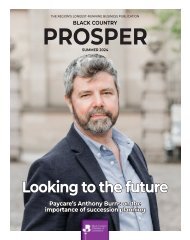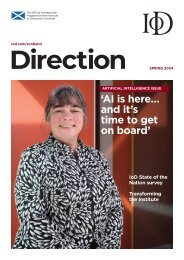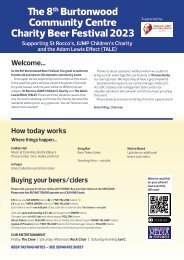IoD Midlands Spring
Institute of Directors, business magazine, director development, business news
Institute of Directors, business magazine, director development, business news
Create successful ePaper yourself
Turn your PDF publications into a flip-book with our unique Google optimized e-Paper software.
‘‘<br />
Our USP is our ability to<br />
respond promptly: TERC<br />
offers a genuine 24-7 service,<br />
with fully trained mental<br />
health personnel ready to<br />
help as soon as your<br />
employees get in touch...<br />
‘‘<br />
the consultations my team handled were a<br />
need to talk through those worries. Calls at<br />
the beginning of the pandemic were<br />
one-offs, and of a short duration.”<br />
The pandemic forced many businesses<br />
to work online with digital contacts, but<br />
for Tracey, that’s business as usual. “We<br />
have always been geared up to provide<br />
services remotely. We have a strong IT<br />
infrastructure in place and excellent<br />
digital outreach. Our counsellors and<br />
therapists are based around the UK, as are<br />
our clients, so it’s always made sense to be<br />
able to reach out to people through secure<br />
online systems. We offer confidential<br />
GDPR compliant single session-use<br />
platforms that people are comfortable<br />
talking to our counsellors through.”<br />
As the pandemic evolved, so did the<br />
nature of TERC’s work. “Once we got over<br />
the initial shock of lockdowns, people’s<br />
needs changed. They became more<br />
nuanced and required more structured<br />
interventions. People were still concerned<br />
about their immediate health but to that<br />
was added worries about mixing with<br />
others again. We also saw calls around<br />
employee perceptions of bullying to get<br />
workloads completed. People reported<br />
feeling ‘burnt out’, stating they couldn’t<br />
achieve any kind of work/life balance.<br />
“There were people worrying about job<br />
security, and asking questions on legal<br />
and financial issues. Others were struggling<br />
to cope with caring responsibilities. It was<br />
incredibly stressful for many.”<br />
Sadly, TERC also handled calls around<br />
domestic abuse, relationship breakdowns<br />
and, tragically, suicidal ideas and self harm.<br />
By the time the second lockdown was in<br />
place in late autumn, cries for help had<br />
shifted again. “By that stage we were<br />
taking calls around grief and bereavement,<br />
particularly where people hadn’t been<br />
able to say goodbye to their loved ones.”<br />
Worryingly for the future, TERC<br />
counsellors were also reporting a huge<br />
increase in clients who had developed<br />
poor coping mechanisms such as OCD,<br />
and there was an increase in clients<br />
reporting alcohol and substance misuse.<br />
Indeed, the areas TERC was asked to<br />
cover became so broad as to appear<br />
all-encompassing. “Parents were calling<br />
for advice on special educational needs<br />
issues for their children. It just gives you<br />
some idea of the weight the world was<br />
carrying. Everything was pressing down<br />
on our clients’ employees; some were<br />
desperate for help.”<br />
She had high praise for the team at<br />
TERC who delivered support “at a level I’d<br />
never anticipated,” admits Tracey. “So<br />
many people worried, anxious, stressed…<br />
but at the same time it was great to be able<br />
to help and support people at a time they<br />
needed it most.”<br />
Other challenges came from clients who<br />
had been furloughed. “Their mental<br />
health was affected by changes in their<br />
financial status and the uncertainty<br />
around their economic future, and that is<br />
completely understandable.”<br />
Her fear is that we’re not out of the<br />
woods yet, either. Yes, the direct threat of<br />
Covid may be receding, but “a lot of<br />
companies are sat on a time bomb,” says<br />
Tracey. “We’ve helped the mental<br />
wellbeing of so many people in the past<br />
year – but there are many more in your<br />
workforces who have carried all that stress<br />
and anxiety without reaching out for help.<br />
Some people are storing up stress and it<br />
will come to a point where they will not be<br />
able to function. They’re in ‘survival<br />
mode’. My hunch is we’re sat on a huge<br />
amount of pressure that will reveal itself in<br />
increased absenteeism and presenteeism<br />
over the next year or so.”<br />
Broadening the conversation, what the<br />
pandemic has shone a light on workplace<br />
culture and mental health, and it’s about<br />
time, Tracey believes. “Businesses need to<br />
take employee mental health seriously.”<br />
“Traditionally, UK businesses haven’t<br />
been good at early interventions when<br />
people struggle. Too often our counsellors<br />
and therapists get involved when<br />
someone has reached a crisis point; what’s<br />
needed is a culture whereby people can<br />
flag up issues, particularly around stress<br />
and anxiety, early; be open and say ‘look,<br />
X is struggling, can we get them some help’.”<br />
She’s concerned about an increase in<br />
‘presenteeism’ – employees coming into<br />
work when they are ill. Increased<br />
presenteeism is associated with rises in<br />
reported common mental health<br />
conditions as well as stress-related<br />
absence, which are the top causes of<br />
long-term sickness absence.<br />
Tracey also stated that ‘leavism’ is an<br />
increasing problem, whereby people are<br />
using annual leave to work as they feel the<br />
need to be visible in the workplace at all<br />
times and to be perceived as constantly<br />
working hard. Continued on page 38<br />
www.iod.com/westmids/events<br />
37

















